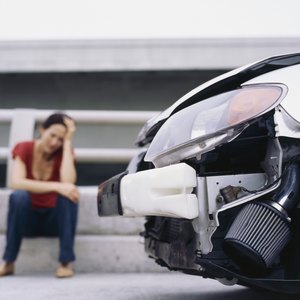
If you are in an auto accident and the damage is covered under your auto insurance policy, your insurance company will provide you with funds to fix your car. If you don't feel amount is fair, you don't have to accept the insurance company's first offer
The Process
It's best to contact your insurance company as soon as possible after you've experienced an accident or vandalism to your vehicle. A representative will follow up with you and ask some questions to determine if the policy covers the claim. After the initial screening, an auto claims adjuster from your insurance company will contact you to assess your vehicle. The adjuster will evaluate the amount of damage and estimate how much money it will take to fix the vehicle. Depending on the insurance company, it may allow you to obtain estimates from approved auto body shops and submit them for review.
The Offer and Negotiations
After reviewing estimates and inspecting the vehicle, your claims adjuster will make you an offer to settle the claim. The company will either offer to issue you a check or issue a check to a body shop doing the work. If you feel the offer is fair, you can accept the check immediately. However, you don't have an obligation to do so. If you think the adjuster low-balled you, you can negotiate the offer. Ask for a copy of the adjuster's evaluation report and make sure that he used comparable vehicles when estimating the cost of repairs. It's helpful to provide supporting evidence to prove the value of your vehicle. For instance, you can mention your vehicle's blue book value or provide an estimate from a different auto shop.
Escalations
If your claims adjuster doesn't budge, and the offer still doesn't feel right, you can escalate the issue within and outside of the company. Ask to speak with the claims adjuster supervisor and express your concerns. If you aren't getting what you feel is fair treatment from anyone in the company, you can contact an external source to help you with your case, such as a consumer advocacy organization or an attorney with experience in car insurance issues.
Getting the Cash
Once you've accepted the payout, the insurance company is released from liability and your claim is closed. If you're leasing your vehicle or still making payments, the leasing company or bank may require you to complete all repairs immediately to maintain the value of the vehicle. If you own your vehicle free and clear, you may not have an obligation to get the repairs done. However, if your vehicle sustains further damage because you didn't make the repairs, your insurance company may not cover more repairs.
References
- Liberty Mutual: Auto Claims Process
- Edmunds: Confessions of an Auto Claims Adjuster
- DMV.org: How Car Insurance Companies Handle Claims
- California Department of Insurance. "So You've Had an Accident, What's Next? - Q. How Does the Insurance Company Evaluate Vehicle Damage?" Accessed May 13, 2020.
- Allstate. "What to Do After a Car Accident: A Step-by-Step Guide." Accessed May 13, 2020.
- GJEL Accident Attorneys. "How Much Does a Lawyer Charge for a Car Accident?" Accessed May 13, 2020.
- Nakase Law Firm. "Guide to Maximum Insurance Money for Whiplash Injury." Accessed May 13, 2020.
- The Law Offices of Anidjar & Levine. "Should I Give an Auto Insurance Company Access to My Medical Records?" Accessed May 13, 2020.
- AllLaw. "Tips for Getting the Best Personal Injury Settlement." Accessed May 13, 2020.
- State of Wisconsin Office of the Commissioner of Insurance. "Consumer's Guide to Auto Insurance," Page 10. Accessed May 13, 2020.
- Geico. "Glossary Of Insurance Terms And Definitions." Accessed May 13, 2020.
- Edmunds. "How Car Insurance Works When You've Had an Accident." Accessed May 13, 2020.
- Legal Information Institute. "Indemnify." Accessed May 13, 2020.
- State of Wisconsin Office of the Commissioner of Insurance. "Consumer's Guide to Auto Insurance," Page 11. Accessed May 13, 2020.
Writer Bio
Based in San Diego, Calif., Madison Garcia is a writer specializing in business topics. Garcia received her Master of Science in accountancy from San Diego State University.

